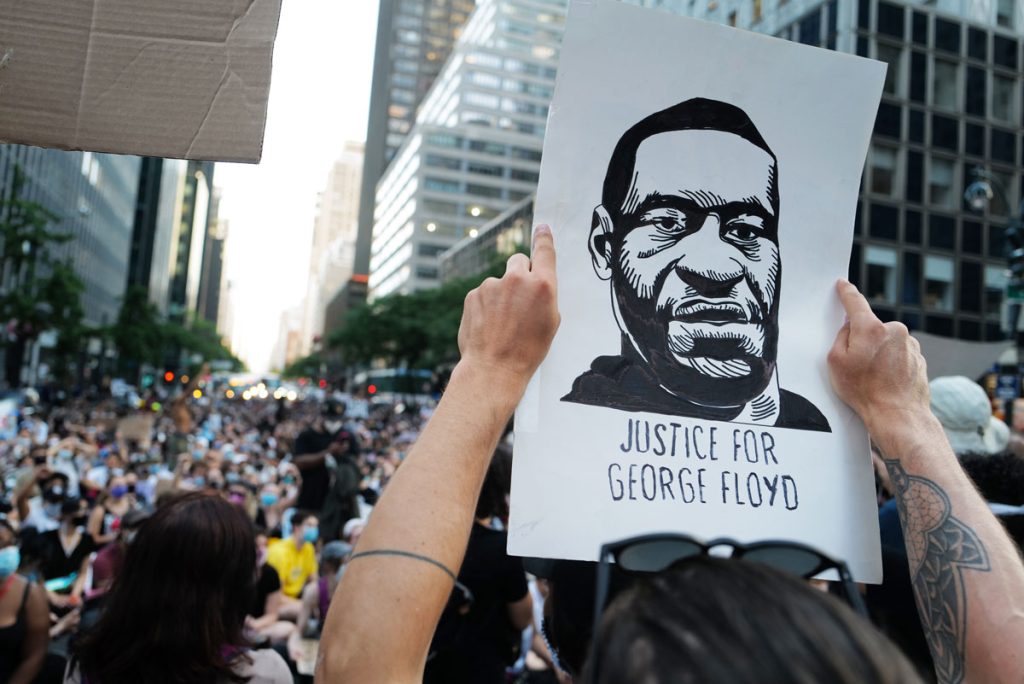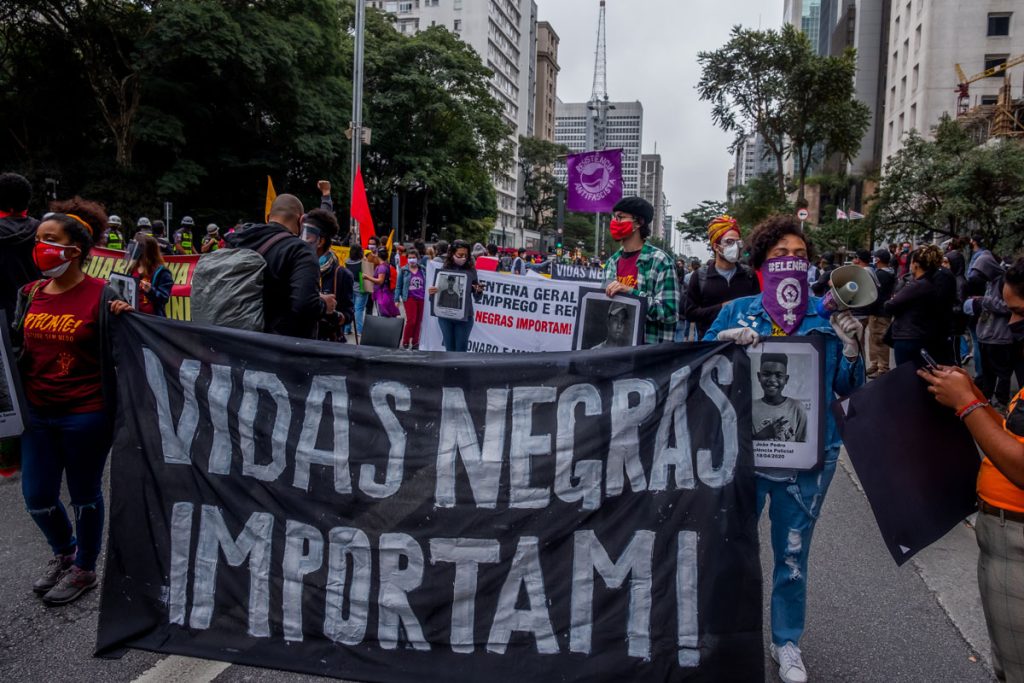‘The story of philanthropy since the global protests for racial justice in the summer of 2020 should be understood in the context of the prior decade, if not the past 20 years’, said Lori Villarosa, Executive Director of Philanthropic Initiative for Racial Equity.
‘The murder of George Floyd did indeed catalyze an unprecedented global mobilization of protests for racial justice – accompanied by an unprecedented number of statements and promises of donations from foundations, corporations and individuals.’
Yet research by PRE in 2021 found that of the $11.9 billion pledged by foundations and corporations for racial justice in the U.S. in 2020, less than two-thirds of what was promised actually made it to grantees[1]. Two years after Floyd’s murder, where are we? Have there been lasting changes in the philanthropy sector? To understand what’s happening with work for racial justice, Alliance magazine reached out to four contributors around the world to share their perspectives.
When looking at racial justice, we must take a long view
 Lori Villarosa, Executive Director, PRE, with contributions from Ben Francisco Maulbeck, Senior Fellow, PRE
Lori Villarosa, Executive Director, PRE, with contributions from Ben Francisco Maulbeck, Senior Fellow, PRE
Media reports exaggerating the amounts granted to racial justice – and the picture that it was somehow an overnight occurrence – were both highly inaccurate. Both myths have negative consequences at a time when philanthropy should be scaling up support and building on the strong, though still underfunded, ecosystem of powerfully impactful work led by Black, Brown, and other racially impacted communities.
While initial summaries tracking racial justice pledges in 2020 tallied $11 billion or more, our preliminary review of actual grants awarded in the U.S. found only about $3.4 billion focused on communities of colour. Much of this funding was for afterschool programs, scholarship funds, workforce development, and other services. Only about $1 billion was focused on racial justice – and of that, an even smaller fraction was devoted to the grassroots organizing directly connected to the ongoing movement for racial justice.
Meaningful change looks like philanthropy supporting Black feminist movements in the Global South and Global north in response to Black life and not just Black death.
The inaccurate, exaggerated depiction of the 2020 increase in racial justice funding has already caused worrisome backlash. Right-wing pundits have attacked ‘woke’ philanthropy, their latest bogeyman, for focusing exclusively on racial justice – exaggerating, mischaracterizing, and demonizing democratic shifts that have been growing over years. Some centrists have been complicit in this argument, worrying that the calls for racial justice are ‘too polarizing’ and to blame for political losses, rather than recognizing that it’s the fight against basic equity and fairness that is both divisive and in many cases the lack of courage to name that which allows it to spread and thwart progress. The claims are both absurd and ironic when less than one per cent of philanthropic dollars are focused on racial justice – and the bulk of the 2020 pledges actually went to centrist reform strategies such as education access and small business loans in communities of colour. Perhaps most disturbingly, even some generally supportive donors now believe that grassroots racial justice groups are well-resourced – when most saw little to no money from the philanthropic pledges of 2020.
Yet as evidenced by continuing racial disparities, tragic deadly white nationalism & racist hatred stoked in the US & too many other countries, the need for investment in racial justice work led by Black and Brown and other racialized, impacted communities remains crucial.

George Floyd was murdered by police on 25 May 2020. His death inspired a global movement calling for racial justice. Two years later, where are we now? Photo credit: Shutterstock
The sector is learning
Fortunately, there have been promising shifts in philanthropy – driven by the leadership of racial justice movement and a growing number of advocates within philanthropy pushing funders to meaningfully address racial equity and racial justice – within the US, Canada, UK, and increasingly throughout regions across the globe. Funders from more than 22 countries have downloaded PRE’s Grantmaking with a Racial Justice Lens and we have partner networks engaging thousands of funders and donor networks to do more work on both shifting their operations and strategies to recognize the strength of solutions led by those most impacted.
But change agents within the philanthropic sector must be prepared for back-pedalling and backlash – not responding with fear or meekness but being savvy and aware because if they have not yet faced it, they either aren’t pushing enough or maybe naively thwarted. Those who are making progress should continue to share their honest lessons and successes. And those who have not yet advanced either racial equity or racial justice lens should recognise they are coming late to the game, but the advantage is their peers and most importantly, their community of colour leaders have been making traction even with far too little.
Read more: From tragedies to transformation: Using a racial justice lens in global grantmaking
The added resourcing is giving some organizations greater potential and reach, and much of the racial justice ecosystem is operating with more intersectionality and effectiveness than it has before. Even those who did receive significant increases in 2020 are likely facing the cliff of many one-time-only grants ending just when they have begun increasing capacity for even greater impact.
Funders who are truly committed to racial justice must double down on resourcing the decades-long process of building movements and making change.
Two years later, ‘the goal was not reached’
 Muhammed Lamin Saidykhan, Movement Coordinator Africans Rising
Muhammed Lamin Saidykhan, Movement Coordinator Africans Rising
There were some attempts made by philanthropists to deliver on the racial justice pledges they made in the summer of 2020, but overall, the goal was not reached.
On where the funding went – and didn’t
Africans Rising received a $200,000 grant from Black Live Matters Global Foundation (BLMGF) to support black movements championing racial justice issues in 2020. But more funding is needed to support movements on the continent. The support received by our movements included basic needs like warm clothing, temporary accommodation, food packets, and campaigns against racism for Africans fleeing the Ukraine crisis. Again, there is a surge in unjust killing and police brutality of unarmed black people in the US and their families are yet to receive justice and support.
The call for #BlackLivesMatter is more important than ever
Some progress has been made – there has been an increase in the formation of coalitions of Black movements across the world. But they are yet to be more coordinated and structured to work effectively towards a common goal, taking collective and rapid actions. More support is needed as innocent Black people are killed often in and outside the US, including Africa. The call for #BlackLiveMatters is more important today than ever before.
A view from Africa
Africans are deeply concerned and involved in racial injustice conversations on the continent. The African media has spotlighted the maltreatment of Black people everywhere, including recently in the US and Europe, as well as how Africans have been experiencing discrimination in the Ukraine refugee crisis. Africans Rising and other like-minded partners have been organising citizen-led conversations aimed at mapping out real problems, sharing lessons learned, and proposing immediate and long-term solutions.
Funders who are truly committed to racial justice must double down on resourcing the decades-long process of building movements and making change.
There have been strong advocacy and campaign efforts on different social media platforms, local media outlets, and other activist spaces aimed at developing long-lasting strategies and actions to end racial injustice. Africans Rising movement is working in solidarity with movements, artists groups and other CSOs on the continent and the diaspora to fight racial injustice on its people everywhere.
‘Our movements don’t need pledges, they deserve action.’
 Tynesha McHarris, Co-Founder, Black Feminist Fund
Tynesha McHarris, Co-Founder, Black Feminist Fund
Philanthropy and the corporate world have not fulfilled the promises to racial justice they made in the summer of 2020. We have reports and data that outline the pledges made – and the gap between what they promised and what has landed at the doorstep of movements is disheartening and indefensible. The resources that movements receive in response to demands and calls to action from movement leaders are often led by Black people in leadership across the sector. Leaders like Crystal Hayling, leader at the Libra Foundation and convener of the Democracy Frontlines Fund, is an example of the historic role of Black women in organizing and galvanizing donors to rise to the occasion and move resources to movements boldly. The Black Feminist Fund was launched in early 2021, after a ten-year journey, as an intervention in the philanthropic space to move resources to Black feminist movements around the world. We know that we also can’t rely on spectacular Black tragedies for the broader philanthropic community to be compelled to act. An act that is too often short-sighted and short-lived.
On the estimated $11.9 billion pledged to racial justice causes in 2020
In 2020 and 2021, Black movements in the U.S. did see some increased resources but it was too often made in one-year gifts. There is a significant gap between what was pledged and what resourced racial justice organizations. Where the rest of the resources went, we are not clear. We assume they stayed as a pledge. Our movements don’t need pledges, they deserve action.
On if there has been meaningful change in the sector since summer 2020
Meaningful change looks like philanthropy supporting Black feminist movements in the Global South and Global north in response to Black life and not just Black death. It looks like support for movements in multi-year grants. It looks like true partnerships where power can be shared. It does not look like heightened surveillance, suspicion and criminalization of Black leadership, and in particular Black women, in response to increased resources. It is time we fund Black feminists like we want them to win. And we must do it every year, even when there is backlash. Especially when there is backlash. That is what meaningful change in philanthropy can look like – it’s solidarity.

A Black Lives Matter march in São Paulo, Brazil. Photo credit: Shutterstock
In Brazil, the movement for racial equity steps forward and back
 Fernanda Lopes, Progamme Director, Baobá Fund for Racial Equity
Fernanda Lopes, Progamme Director, Baobá Fund for Racial Equity
In 2020 in Brazil, over 6,000 people were killed by police – and almost 80 per cent were Black. The Black Lives Matter protests that year, which were triggered globally by the brutal murder of George Floyd in the U.S. in May, spread throughout Brazil. The movement for racial justice was again roused in November, after João Alberto Silveira Freitas, a 40-year-old Black Brazilian father, was beaten to death by security guards at a supermarket in Porto Alegre the day before Black Consciousness Day, an official holiday in many Brazilian cities that honours our African heritage.
In Brazil, more than half of the population is Black, and racism has had a strong influence on social inequalities. During 2020, many professed a commitment to change. But so far, the most progressive racial justice action in the philanthropy sector has been a group of more than 60 foundations and corporations that are working on the promotion of racial diversity in the labour market. Overall, much is still lacking, especially as there are still no formal and public mechanisms for accountability over the decisions and applications of social investments that can be monitored and evaluated, which weakens the racial justice agenda.
For the last two years, the Baobá Fund for Racial Equity, the first Black Brazilian institution to act as a grantmaker, has established 11 new partnerships. Governed by ethical and management principles, Baobá mobilizes financial and human resources to support Black civil society initiatives across the country. Since its creation in 2011, it has supported around 900 projects throughout the national territory, indirectly reaching around one million people. Over the years, the Fund has established itself as a reference in terms of governance, efficiency, and effectiveness in the field.
Over the 11 years the Baobá Fund has been operational, it does feel like the issue of racial equity has become much more central in the philanthropic ecosystem recently. This change shows that, in partnership with other players, we have been efficient in influencing the ecosystem to ensure that philanthropy contributes more effectively to fighting racism and promoting social justice in Brazil.
It does feel like the issue of racial equity has become much more central in the philanthropic ecosystem recently.
But we have also found that this same ecosystem does not seem to be as committed to strengthening and promoting the autonomy of an institution such as ours. In 2021, while fundraising for the cost of operating and institutional development expenses was around $300,000, exclusive donations to support programmatic actions totalled $700,000. Except for the Kellogg Foundation, which in 2011 made a commitment to contribute up to $25 million to the Baobá Fund endowment, there have been no other contributions to our endowment.
But there are signs of change. Last year, the Baobá Fund participated in the due diligence process to choose the social organisations that would benefit from Mackenzie Scott’s donations. The Baobá Fund was one of the 15 Brazilian organisations selected, and the entire process took place through a relationship with her donor advisor. It was an extremely enriching process in many ways: from the way our vision of the future was questioned to the concern to choosing causes that are relevant to Brazilian society. Scott’s vision for the importance of capacity building and philanthropy based on trust made serious advances in how donors should relate to the organisations they choose to support.
Taking a step back, we can see that the Brazilian impact investment ecosystem was heavily influenced by the American and global movement in repudiation of police violence and racial injustice. Transnational companies, such as Verizon, Mastercard, AT&T, EY, Santander, P&G, and the Accenture Foundation, have invested in advancing racial justice in Brazil, as well as institutions with global operations such as the Ford Foundation, Open Society Foundations, and the Kellogg Foundation. Many Brazilian institutions working on these issues for years – such as B3 Social, the partners of GIFE, Instituto Ibirapitanga, Instituto Unibanco, Instituto Itau Cultural, and many others – led the field in its response. In Brazil, 47 companies came together and formed the Movement for Racial Equity (Mo-VER) with a commitment to raising 10,000 Black people to leadership positions by 2030, as well as training and expanding opportunities.
Footnotes
- ^ Philanthropic Initiative Racial Equity’s 2021 report on US grantmaking, Mismatched: Philanthropy’s Response to the Call for Racial Justice, found that the scale of grants reaching racial justice organizing was only a small fraction of the lofty amounts pledged.





Comments (0)
I am appreciative of the information and recommendations you have offered.
I am grateful for the information and the suggestions that you have provided.